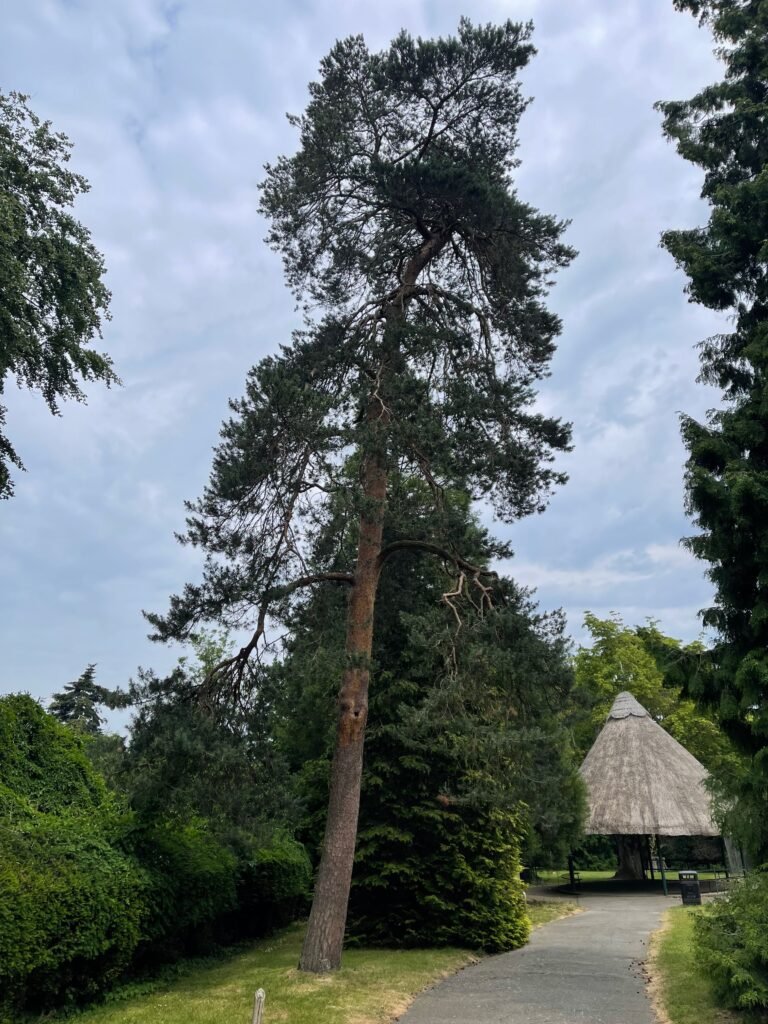Pine, Scots
The Scots Pine (UK), Scotch Pine (US), is a truly stunning evergreen conifer, that can grow to a height of 35m, and may live for 700 years.
A tall straight pine tree. The scaly bark is istinctive orange-brown, which develops plates and fissures with age. Twigs are green-brown and hairless.

Photo supplied by: Alan Payne
Common Name:
Scots Pine
Scentific Name:
Pinus sylvestris
Tree No:
78
Location:
C11

The needle-like leaves are blue-green and slightly twisted, and grow in pairs on short side shoots.

Credit: This could be your image
Scots pine is monoecious, meaning both male and female flowers grow on the same tree. Male flowers comprise clusters of yellow anthers at the base of shoots. Female flowers are small, red-purple and globular, and grow at the tips of new shoots.

Credit: This could be your image
After pollination by wind, the female flowers turn green and develop into cones. They mature the following season, so there are always cones of different ages on the one tree. Mature cones are grey-brown with a raised, circular bump at the centre of each scale.

Credit: This could be your image
Scots pine is the only truly native pine in the UK. It thrives in heathland and is widely planted for timber, but is also found in abundance in the Caledonian pine forest in the Scottish Highlands.
The Caledonian forest is a priority habitat under the UK Biodiversity Action Plan and is home to many rare species. Mammals include red squirrel, pine marten and Scottish wildcat. Scots pines in southern England are also the main caterpillar foodplant for the pine hawk-moth.
When used for commercial production of timber rotations of 50 to 120 years are normal. Its valuable timber is used for wood pulp and sawn timber.
Scots pine timber is one of the strongest softwoods available and is widely used in the construction industry for joinery. It is used in the manufacture of telegraph poles, pit props, gate posts and fencing. The tree can also be tapped for resin to make turpentine. Other uses have included rope made from the inner bark, tar from the roots and a dye from the cones. Dry cones can be used as kindling for fires.
Optional Content.
Tree Listings
Mulberry
Page Title Overview text Diffent points following a single enter.Photo supplied by:Common Name:Xxx Scentific Name:Xxx Tree No:00 Location:X0Content to follow. Credit: This could be your image Content to follow. Credit: This could be your image...
Golden Irish Yew
Yew, Golden Irish The Golden Irish Yew, is an evergreen conifer, that can grow to a height of 7m, and may live for over 2,000 years, although 1,500 years may be more typical. The bark is brown-grey with purple tones, and it peels. This tree was planted for the...
Goat Willow
Willow, Goat The Goat Willow, also known as the pussy willow, is a broadleaved deciduous tree, that can grow to a height of 10m, and may live for 300 years. The bark is grey-brown and develops diamond-shaped fissures with age. Twigs are hairy at first but become...
Whitebeam
Whitebeam The Whitebeam, is a charming broadleaved deciduous tree, that can grow to a height of 15m, and may live for 200 years. They're compact and domed. The bark and twigs are grey, and the shoots are brick red in sunlight but greyish-green in shade. This tree was...
Black Walnut
Walnut, Black The Walnut, is a broadleaved deciduous tree, that can grow to a height of 35m, and may live for 200 years. They typically have a short trunk and broad crown, though can be narrower if grown in a woodland situation. The bark is smooth and olive-brown when...
Sycamore
Sycamore Tree The Sycamore Tree, is a large broadleaved deciduous tree, that can grow to a height of 35m, and may live for 400 years. The bark is dark pink-grey, and smooth when young, but becomes cracked and develops small plates with age. Twigs are pink-brown and...
Snowy Mespil
Snowy Mespil The Snowy Mespil, is small deciduous tree, that can grow to a height of 7m, and may live for 60 years. This tree was planted in 1995 By Mrs M. Pocock in memory of her husband. Photo supplied by: Alan PayneCommon Name:Snowy Mespil Scentific...
Rowan Tree
Rowan Tree The Rowan Tree, is an elegant broadleaved deciduous tree, that can grow to a height of 15m, and may live for 200 years. The bark is smooth and silvery grey, and leaf buds are purple and hairy. Photo supplied by: Alan PayneCommon Name:Rowan Tree...
Rowan Tree
Rowan Tree The Rowan Tree, is an elegant broadleaved deciduous tree, that can grow to a height of 15m, and may live for 200 years. The bark is smooth and silvery grey, and leaf buds are purple and hairy. Photo supplied by: Alan PayneCommon Name:Rowan Tree...
Wollemi Pine
Pine, Wollemi Content to follow. Photo supplied by: Alan PayneCommon Name:Wollemi Pine Scentific Name:Wollemia nobilis Tree No:190 Location:D7Content to follow. Credit: This could be your image Content to follow. Credit: This could be your image...
Red Oak
Oak, Red The Red Oak, is a fast growing broadleaved deciduous tree, that can grow to a height of 25m, and may live for 500 years, although 300 years may be more typical. The bark is smooth and silver-grey when young, and develops warts or ridges with age. Twigs are...
Lucombe Oak
Oak, Lucombe The Lucombe Oak, is a large spreading semi-evergreen tree, that can grow to a height of over 20m, and may live for 240 years. The bark is thick and corky and is fire resistant. Branches on older trees can be quite chunky. The buds are brownish, ovate...
Braintree & Bocking Public Gardens,
43 Bocking End,
Braintree,
CM7 9AE.
Open 9:00 to 4:00pm – January, February.
Open 9:00 to 6:00pm – March.
Open 9:00 to 7:00pm – April.
Open 9:00 to 8:00pm – May, June, July, August.
Open 9:00 to 7:00pm – September.
Open 9:00 to 6:00pm – October.
Open 9:00 to 4:00pm – November December.
Note – The gates are locked at dusk.
Dusk is subject to seasonal variation, so closing times may not be exactly to the schedule, at the transitions.
No dogs allowed in the gardens.
No alcohol to be consumed in the gardens.
No riding of cycles or scooters in the gardens.
General Enquiries
Phone: 01376 773066
Email: info@braintreeandbockinggardens.co.uk
Tennis Enquiries
Phone: 01376 773070
Email: tennis@braintreeandbockinggardens.co.uk
© Braintree & Bocking Public Gardens Trust 2017-2021. All Rights Reserved.
Registered Charity Number 212989
Get in touch


Braintree and Bocking Public Gardens
We provide, maintain and preserve these unique and beautiful gardens as a community green space.
This content isn't available right now
When this happens, it's usually because the owner only shared it with a small group of people, changed who can see it or it's been deleted.